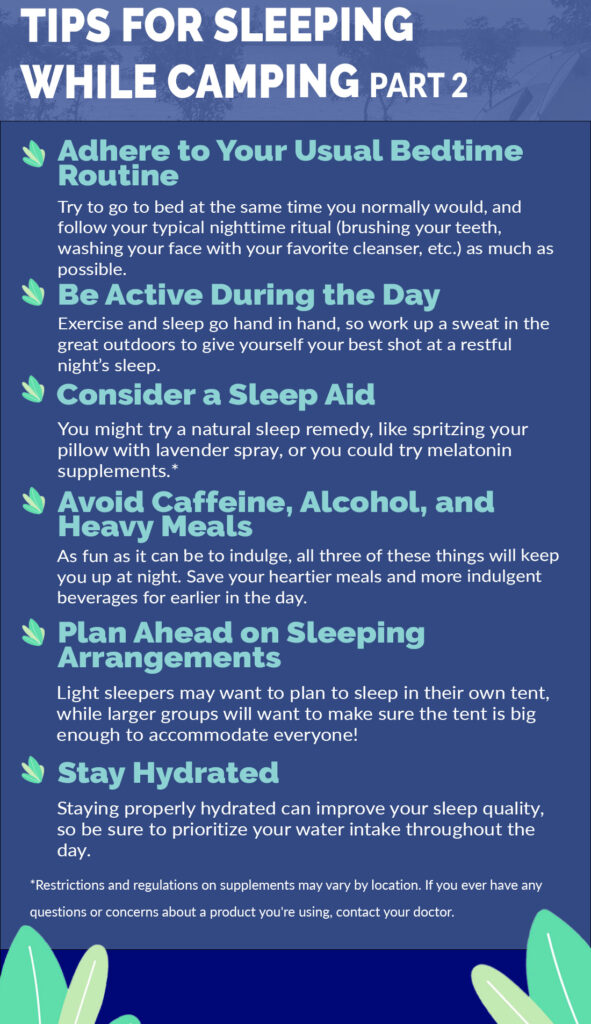Camping allows us to appreciate nature in a delightful manner, and drifting off to sleep under the stars is truly enchanting. However, the truth of resting on the ground during a camping trip can be harsher than anticipated due to the complete shift in surroundings from your typical daily environment.
Achieving restful sleep while camping can be challenging without meticulous preparation since you are stripped of the conveniences found in everyday life.
You’re isolated from the electrical grid that offers illumination, lack control over climatic conditions, and are unprotected from precipitation and sunlight.
10 Best Ways to Sleep While Camping
To counter these difficulties, this article lists the top 10 strategies for achieving good sleep while camping:
1. Comfortable tent bedding
Consider acquiring a snug sleeping bag, cushions, and an air mattress for camping. Options include air, self-inflating, and portable mattresses. Additionally, opt for an inflatable pillow that can be easily compressed and packed into your backpack.
It’s wise to test your sleeping setup before your excursion to ensure it’s still functional. If discomfort arises, be prepared to seek alternatives.
2. Pack a camping sleeping pad
A superior sleeping pad is crucial for comfort inside your tent. Without it, a night in the great outdoors is hardly bearable. Air and portable mattresses make excellent choices due to their suitability for camping. These mattresses are invaluable for any camping trip. Essential attributes include:
- Lightweight nature.
- Compact dimensions.
- Pleasant cushioning.
Air mattresses, with their ability to inflate to a substantial profile and self-inflating designs, provide enhanced support and coziness.
A portable mattress also offers maximal comfort and shields your mattress from dirt, pollen, dampness, and pollutants.
Ensure the mattress’ dimensions, weight, and padding suit your needs. It’s also advisable to consult a guide when selecting a sleeping pad for additional insights.
3. Use a high-quality sleeping bag
A superior sleeping bag furnishes a cozy sleeping spot during camping, something an ordinary, aged sleeping bag cannot offer, as not all sleeping bags are alike. Look for the following in a camping sleeping bag:
- Lightweight architecture.
- Variety in sizes.
- Adequate temperature rating.
- Durable fabric and insulation.
Ensure the sleeping bag conforms to the necessary temperature ratings to avoid discomfort from the cold or heat during sleep.
4. Get earplugs
Despite their serene reputation, remote areas bustle with activity at night. Sounds from nocturnal animals, circling birds, and even water can disrupt sleep at night. Earplugs serve as an ideal measure to block out these noisy interruptions.
5. Find an ideal place to pitch your tent
Your choice of tent location can significantly affect your sleep quality. Consider the following when selecting a spot:
- Ground’s levelness: Opt for as flat an area as possible free from rocks.
- Elevation: Choose elevated areas to avoid water-related concerns. Elevated spots ensure dry conditions.
- Quietness: Seek a quiet and tranquil location for setting up your tent.
6. Bring a comfortable pillow
For the pillow, you may choose to bring one from home to avoid disruption to your sleeping pattern. However, for travel, consider a compressible inflatable pillow that fits easily into your backpack.
7. Get a small fan
A compact fan maintains air circulation and keeps mosquitoes at bay on warm nights. It also alleviates the claustrophobic feeling a new environment may induce. Opt for a battery-powered box fan for use without electricity.
8. Wear a sleep mask
Both sunlight and moonlight can interrupt sleep. A sleep mask helps block out light, fostering a conducive sleep environment while camping.
9. Avoid insect bites
Insect bites disrupt sleep. To prevent them:
- Opt for an insect-proof tent.
- Wear mosquito netting over your head.
- Apply insect repellent to your clothing and any exposed skin before bedtime.
10. Avoid excessive food and drinks before bed
Steer clear of heavy and spicy meals at night during camping, as they may lead to discomfort affecting sleep. Also, limit alcohol and caffeine intake post-afternoon to preserve sleep quality. Moreover, consuming excessive fluids can lead to frequent bathroom visits, which is particularly bothersome in unfamiliar surroundings.
Stay Calm
It’s common to encounter difficulties sleeping in an unfamiliar setting. Initial nights may pose challenges. Adhere to your usual sleep routine, remain calm, and engage in deep breathing. This approach will naturally usher in sleep as the evening progresses.
- “Sleep Like Royalty: Discover the Lucid 12″ Cal King Mattress!” - February 14, 2024
- “Is Your Mattress Past Its Prime? Find Out Now!” - February 11, 2024
- Sleep Better Every Season: Seasonal Sleep Tips - January 26, 2024











